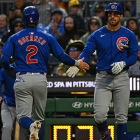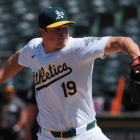The Astros find themselves in a similar situation to Justin Verlander's last start this postseason, in the sense that Verlander is squaring off against another utility pitcher. Verlander, now 4-0 this postseason, is squaring off against Rich Hill, who has two no-decisions after going four and five innings in his first two starts, respectively. Hill pitched well in both starts, but at this point in the season Dave Roberts tends to trust his bullpen in anything past the fifth inning.
Verlander is the definition of an old-school pitcher. He isn't overpowering by any means, but he's similar to Clayton Kershaw in that he uses a precise fourseam to set up his other pitches. Also like Kershaw, his slider has become his complementary pitch. The key difference is, with Verlander being right-handed, his slider backdoors on right-handed hitters, making it a particularly lethal pitch.
Hill, meanwhile, could not be more different. Hill is kept on a stricter pitch count, due to the strenuous nature of being a curveball pitcher. In both of his first two playoff starts, Hill was taken out before 80 pitches in spite of pitching well. This is why the Dodgers having such a deep bullpen, a notable weakness of theirs in the past, has been so big this postseason. It allows them set games up in a more deliberate way.
Justin Verlander pitch selection
Verlander's gameplan isn't anything crazy. Set up the breaking stuff with a fourseam, and get batters waving with the slider. His slider is a pitch that he's developed very well over the past few years as his fastball velocity has deteriorated to the 95 mph. He's now pitching smarter instead of harder.
| Regular vs. Postseason | Fourseam | Cutter | Sinker | Curveball | Slider | Changeup |
|---|---|---|---|---|---|---|
Regular Season | 57.81% | 2.15% | 0.35% | 14.02% | 21.50% | 3.91% |
Postseason | 58.56% | 0.00% | 0.00% | 11.41% | 27% | 3.04% |
At this point in his career, you won't find someone that stays truer to themselves than Justin Verlander. He didn't change much of anything from the regular to the postseason, outside of becoming dependent on the slider as his hard breaking ball. He eschewed the cutter and sinker (he threw a weird amount of cutters in the middle of the season before weening it out of his arsenal) and started to lean on the slider as his best pitch. His curveball numbers also dropped marginally, another byproduct of the slider becoming so reliable.
Rich Hill pitch selection
Hill is the polar opposite. He's narrowed himself down to a two-pitch pitcher this postseason. Again, the similarity to Luis Severino is apparent here. He's a pitcher designed to go four-to-five innings to set the rest of the game up for his excellent bullpen. The key distinction is that Severino throws power, and Hill is the definition of a crafty pitcher. His entire gameplan is based on getting people out in front of and on top of his curveball, which is almost assuredly his best pitch.
| Regular vs. Postseason | Fourseam | Curveball | Slider | Cutter | Sinker | Changeup |
|---|---|---|---|---|---|---|
Regular Season | 52.80% | 35.11% | 3.34% | 2.15% | 0.01% | 0.71% |
Postseason | 65.38% | 33.33% | 1.28% | 0.00% | 0.00% | 0.00% |
For Hill, the name of the game is gamesmanship. There is no more important aspect to his game than the person calling it. Someone relying on fastball-curve is taking a huge chance of sporadically getting rocked. It hasn't happened this postseason, but the Astros have pop in their bats (even though you wouldn't know it looking at them lately). All it takes is one missed pitch to give the Astros a lead that Verlander can ride to a win. However, Hill is one of the best in the business at what he does. He's a patient, smart pitcher that doesn't take unnecessary risks. The endgame is to get four or five innings and get the ball to the formidable bullpen (it was Brandon Morrow in his first two starts, today it might be Maeda -- although Morrow could be good to go after limited action Tuesday). It's worked in Hill's first two starts.
This is the second straight Verlander matchup in which it's an old-school dealer against manager bullpen-ball. It's a dangerous game for the Dodgers to play, but their bullpen is so deep that it's perfectly viable. Through two starts, Hill has given up three runs. Verlander, meanwhile, is having a remarkable postseason. In his three starts, he's gone 22 innings and allowed three runs. His WHIP in those 22 innings is 0.90. He's done everything the Astros have asked of him in their championship chase, and now they have to ask him to do just a bit more.
Edge: Astros
Bullpenning didn't work for the Yankees, and on paper it doesn't work for the Dodgers either. Verlander has been so dominant this postseason, seeing him come back on full rest it's hard to bet against him. Similar to Kershaw's matchup with Dallas Keuchel in Game 1, Verlander would have the edge in nearly any matchup this series. The drive is there -- this is why the Astros traded for him. He's 4-0 this postseason with a bullpen appearance, something he never did before this year. He's become a jack of all trades. The Dodgers' bullpen is deep enough to keep this game close. The Astros' bats are the X-factor. They absolutely need to get something -- anything -- going if they're going to steal a game in Los Angeles. Verlander has his work cut out for him against this lineup, but he did against the Yankees too.






















